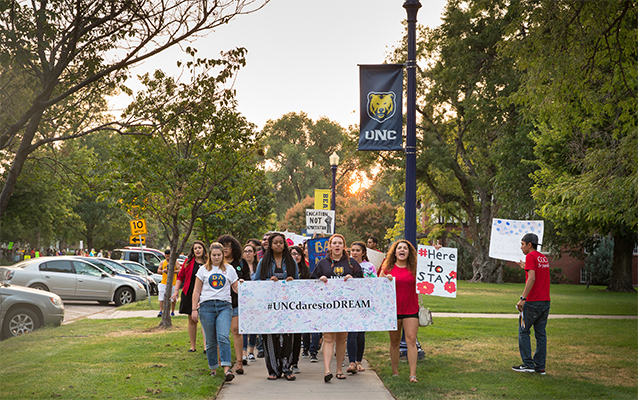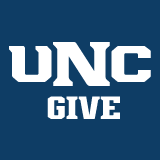Prior to June’s U.S. Supreme Court ruling on DACA, UNC faculty kickstarted a crowdfunding campaign, which highlights the ways a small gift can make a big difference in students’ lives.
In June, the U.S. Supreme Court ruled that the Trump administration’s attempt to end DACA in 2017 would not stand. DACA, the U.S. immigration program that provides “Deferred Action for Childhood Arrivals,” allows many of our UNC students to live and work legally in the U.S., relieving stress and allowing them to earn money to pay for their degrees.
After the ruling, UNC released a statement in support of its DACA and undocumented students, also known as DREAMers, and promised to keep fighting for a permanent solution for these students, in particular through its Student Support Task Force.
Whitney Duncan, Ph.D., Britney Kyle, Ph.D., both associate professors of Anthropology at UNC, and Robert Weis, Ph.D., professor of History, have been instrumental in various stages of the faculty-led Student Support Task Force. In 2017, they organized an expert panel to answer immigration questions and brought lawyers to campus to help students with DACA renewals when the Trump administration attempted to end DACA.
Students with DACA status are granted renewable two-year documentation to work and study in the U.S., based on meeting certain age and education eligibility requirements. DACA is no longer available for new applicants, but current recipients can renew their status every two years, enabling them to continue working, paying taxes and (in the case of many) paying for their education. Each renewal application comes with a $495 fee.
In 2016, the Task Force started the DACA Scholarship fund through the UNC Foundation. In advance of the Supreme Court decision in June and knowing that UNC’s DREAMers would need additional financial support, Kyle worked with UNC’s annual giving office to set up a crowdfunding campaign to encourage additional support for the fund.
The June fundraiser brought in a total of $7,525 from 90 donations — an average of just over $80 per gift — to add to the DACA Scholarship. Initially, the organizers set a goal to raise $2,500, but quickly increased the goal after UNC faculty, staff and alumni stepped up to participate in the crowdfunding campaign.
The fund will continue to make a critical difference for students. “The main purpose of that scholarship is for us to provide DACA reimbursement, or the reimbursement for the $495 fee that students have to pay for the renewal of DACA,” says Rudy Vargas, coordinator of UNC’s DREAMer Engagement Program (which supports undocumented and “DACAmented” students) and Undocumented Student Services. “However, we have been given permission to work with the students, and if there is anything that students might need at UNC or if they're needing financial assistance, we can definitely tap into that scholarship and assist the students at UNC.”
Vargas says that a student might need a smaller amount of money for food, or a textbook, and the fund allows them the flexibility to disburse that money based on individual need. So even giving $25 may provide for a specific $25 need.
Sometimes the needs of students reflect the types of funds they are eligible to receive. When UNC’s DACA students were ineligible to receive CARES Act due to federal conditions in the appropriation, UNC provided support through other donor-funded support like the Disaster Relief Fund.
Alumni and donor generosity has extended to other forms of support for UNC’s DREAMers. Recently Vargas worked with UNC’s Alumni Relations office to recruit alumni volunteers to help students plan for their career and discuss experiences that will help them succeed after graduation.
“Our goal is to help connect students to alumni who share similar experiences,” says Norma Juárez, assistant director of Alumni Relations. “Those experiences can be a number of things like major, industry, similar backgrounds, affinities, interest groups and sports, among other things. We connect students to the Bear Network to provide resources and opportunities for students to help them be successful.”
The sentiment of support and giving back extends to the peer support provided by the DREAMer Engagement Program’s student coordinator.
“What I love about DREAMer students at UNC is that they have a really close community,” Vargas says. “Seeing that students have each other as a support system, that's amazing.”
In addition to supporting one another, DREAMer students at UNC have been standing up for what they believe, Vargas says, especially during the pandemic and protests against racial injustice.
“Although they're hurting, they also want to fight and they also want to make sure that there's equality for everyone,” Vargas says.
Vargas notes that a club for DREAMers at UNC has received an award because of their extensive community service work, especially using Spanish language skills and other cultural competencies to assist the Greeley community.
“I'm willing to say that a hundred percent or 99 percent of the time, these students are getting into education so that they can do things for others,” Vargas says. “And I see that because everyone is always willing to stop what they're doing and help other students. And because we have so many mentors who keep coming back, and they keep wanting to encourage students who are starting at UNC.”
Other ways to support DREAMers at UNC
You can support DREAMers by donating to the DACA Scholarship fund.
Vargas says it’s also important to not make assumptions — DACA recipients come from all over the world — or try to force someone to tell you their documentation status. UNC’s Office of Equity and Inclusion also offers DREAMer Zone trainings throughout the year about how to be a good friend to the DREAMer community.



